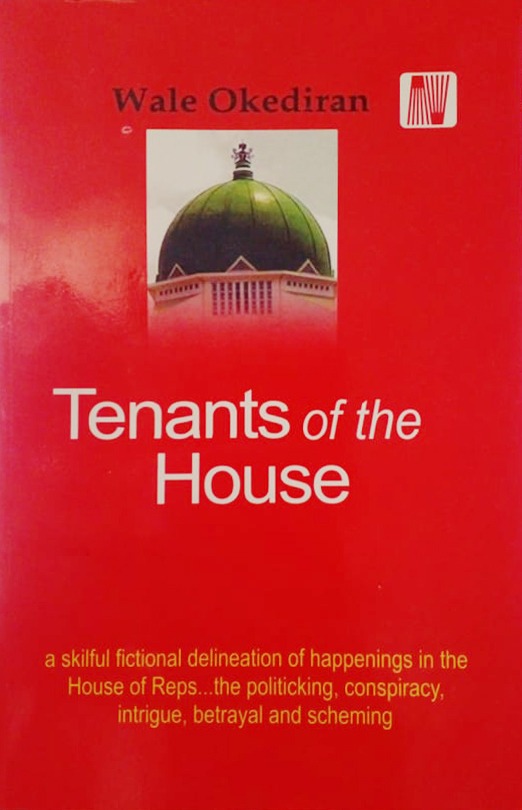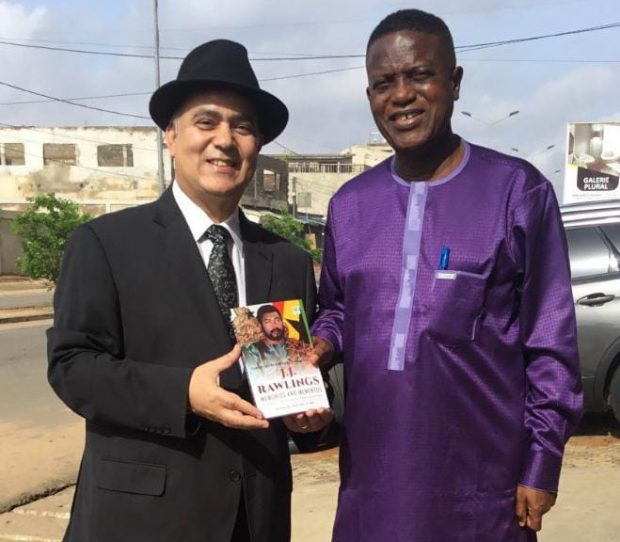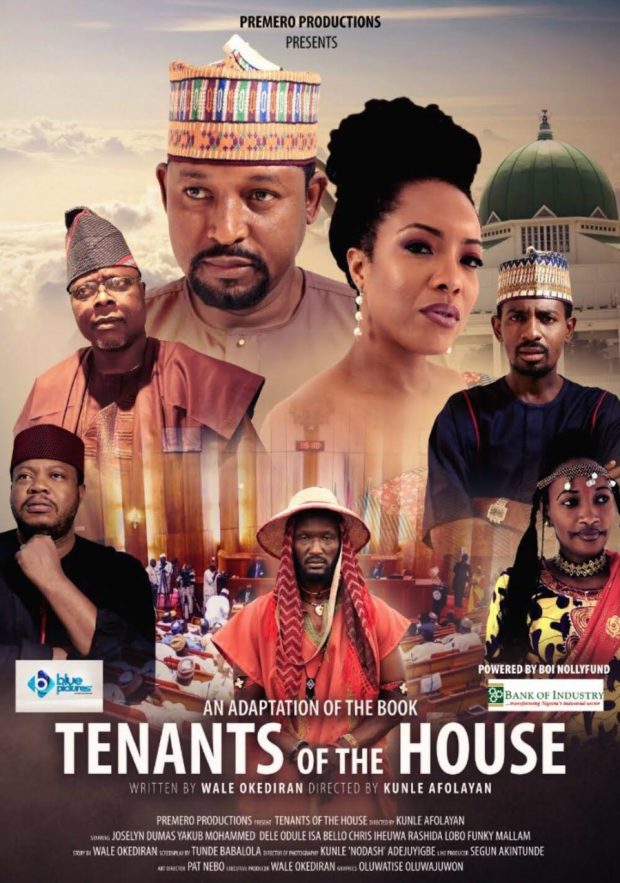Tenants of the House: The novel, the film and the author

The novel cover
By Ashraf Aboul-Yazid
CAIRO: “Tenants of the House” is a socio-political film, inspired by the novel written by Dr. Wale Okediran, a medical doctor, former President of the Association of Nigerian Authors (ANA), and current general secretary of Pan African Writers Association (PAWA).
I came to know Dr. Okediran when he invited me to be one of the judges of PAWA’s 2022 African Poetry Prize. For four months we were keeping our communication online, but last April a good chance offered me the first meeting with him, in Lomé, the Togolese capital city.

The novel’s author, Dr. Wale Okediran, with Ashraf Aboul-Yazid
Dr. Okediran had come to Togo in his official capacity as the Secretary General of the Pan African Writers Association (PAWA) with its headquarters in Accra, Ghana, for the first edition of the Togo International Writers Conference. The Conference which was to discuss the contribution of African Literature to the UN Strategic Development Goals (SDG) was also designed to celebrate the World Book and Copyright Day on April 23.
Dr. Okediran gifted me his novel “Tenants of the House”, which is a skillful fictional delineation of the ugly colors of Nigeria politics as Honorable Samuel Bakuras attempt to correct what he thought was wrong with the intricate and demanding job of lawmaking at the Federal House of Representatives threw him headlong into a series of confounding conflicts.

The Movie poster
The novel was filmed as a treatment about conspiracy in power, dangerous romance and girl-child education. Dr. Okediran wrote his novel to document parts of his experience as a former member of the House of Representatives. The book won the 2013 Wole Soyinka Prize for Literature.
I asked him: “Your novel Tenants of the House was turned into a movie, how would you rate this experience?”
He answered: “As with many of my success stories, the idea of adapting my award -winning Novel; TENANTS OF THE HOUSE (TOTH) into a movie was not mine. The credit belonged to an Irish film maker friend of mine, Cashmere (Cash) Hogan. Cash and I were introduced by a mutual acquittance one rainy day at the Ibadan Polo Club where I had gone to watch the annual Polo Competition a few years ago. Unknown to me, Cash who had read TOTH was able to convince me on the need to adapt the book into a movie. One thing led to another and I took advantage of the Nigerian Government Bank Of Industry which gave me a loan facility to shoot the Film as the Film Producer with Kunle Afolayan as the Film Director. We had a successful shoot as well as a Premiere which took place in Abuja, Nigeria in November 2019.”
He added: “Judging from the copious amount of positive reactions that greeted the Film Premiere as well as other private screenings, it is obvious that we have been able to produce an artistically successful movie. For this we thank God. My prayer now is to have a commercially successful movie so I can pay back my ‘gbese’ and start sleeping normally again.”

Another poster of the “Tenants of the House”
According to cinema critics, “Tenants of the House” is a visual political expose on Nigeria’s ruling class including the conflict between personal and national interest wrapped with a garb of emotions. The movie featured actors like Joselyn Dumas, Yakub Mohammed, Dele Odule and is directed by Kunle Afolayan from a screenplay worked out of the novel by Tunde Babalola.
The novel was one of Okediran’s fourteen novels he authored, out of which ten are adult fiction and three are for children. Many of the books are on the reading lists of several Nigerian Universities. In addition, he is also the author of the Biographies of five famous Nigerians. His collaborative works include, Human Rights Educational Book for Children (Amnesty Int., Nig. 1995) and Encyclopedia of Post-Colonial Literature in English (Routledge, 11 New Fetter Lane, London). A multiple award- winning author, Okediran’s highly acclaimed novel, TENANTS OF THE HOUSE which is a fictional account of his years in the House of Representatives was the 2011 Co Winner of the Wole Soyinka Prize for African Literature and is currently on the reading list of many Nigerian Universities. The US edition of the book was launched in Atlanta, Georgia in April 2012. The film adaptation of the novel; TENANTS OF THE HOUSE was streamed on Netflix Worldwide.

Scenes of “Tenants of the House”
Okediran explained: “We couldn’t start mass screening due to a new law by the Censors Board that both the Director and Producer must join a Guild of Artists before the Film can be screened”.
This led us to discuss Nollywood Film Industry. He added interesting details. This brings me to the impact of the Nollywood Film Industry in global Literature. As many will now realize, the Nigeria’s film industry, Nollywood, has a huge potential to influence Nigeria’s reputation and hence its tourism brand. Testifying to its global reach and volume is the fact that Nollywood produces over 2,000 films annually. This makes it the second largest film industry in the world, second to Bollywood in India and ahead of Hollywood in the US. Nollywood movies are distributed through satellite television, DVDs and theatres around the world. Although Nollywood movies are popular within Nigeria and its expansive diaspora located worldwide, the movies are also well liked throughout the African continent. They are popular in the West African countries of Sierra Leone, Cameroon, Gambia and Gabon. Outside of West Africa, they have growing fans in countries such as Kenya, Uganda, South Africa, and Democratic Republic of Congo. Their popularity has increased among people of African descent beyond both its Nigerian and African populations. In the Americas, Nollywood movies have grown in popularity over the past 10 years in the English-speaking Caribbean island-nations, such as Dominica, St. Lucia, St. Kitts and Nevis, and Trinidad and Tobago. They are also regularly available in the Latin American country of Guyana. Further, the movies have become popular in many former-British colonies due to their entertainment value and their ability to present and express familiar thematic experiences, common to ‘post-colonial’ nations. This industry is therefore an important and far-reaching extension of Nigeria’s brand.
According to a recent report by Euromonitor, Nigeria’s film industry has helped to “change stereotypes about Nigeria by highlighting its culture, norms, creativity and hospitality.” In so doing, it has influenced the willingness for potential travelers to travel to Nigeria, by attracting domestic and continental tourists. Many of these tourists have been visiting film shooting locations in cities like Lagos. African tourist’s arrivals to Nigeria are expected to increase over the next few years, driven by expanding economies throughout Africa. In response, Nollywood has encouraged this type of tourism through reinvesting in tourist-friendly production facilities.
‘Filming cities’ such as Abuja Film Village, Plateau Film City and Lagos Film City are in the pipeline. This Nollywood-driven tourism has had an impact on other non-film sectors, such as the hospitality and transportation industries. It has been a vital and visible source of job creation for Nigeria. It is, therefore, important that the Nigerian Government takes an active role in bolstering such initiatives in entertainment as an integral part of their nation-branding initiatives. Industries like Nollywood represent a sector of the nation-branding project that is organic, people-focussed, produces tangible results, creates jobs across industries and is a believable co-created brand that the nation can rally around.

Dr. Wale Okediran, author and producer, on site of filming “Tenants of the House”
Arguably, the film industry has the ability to project both a nation’s identity and image. It can project both what Nigerians think of Nigeria (the country’s identity) and help to shape the nations image (how others view Nigeria).. The use of FILM to boost tourism in Nigeria should therefore be given more attention by those charged with managing Nigeria’s reputation. The tourism industry is one of the most visible communicators of a nation’s brand and should be supported by the Nigerian Government as part of its tourism building activities. This includes funding the industry, building infrastructure and providing publicity and other support for the industry. Nation-branding initiatives can be as simple as supporting internal development projects. This type of support builds a more sustainable brand that is believable by tourists and nationals alike.
























































